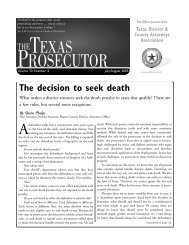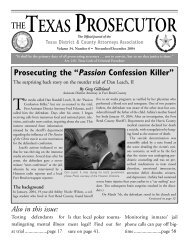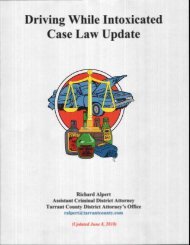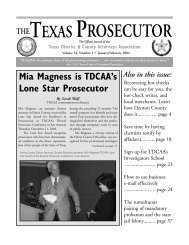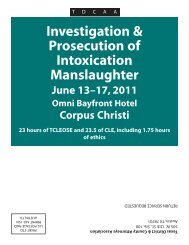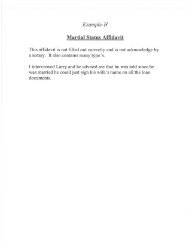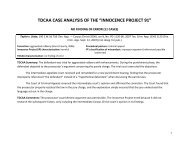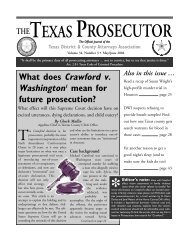Driving While Intoxicated Case Law Update - Texas District ...
Driving While Intoxicated Case Law Update - Texas District ...
Driving While Intoxicated Case Law Update - Texas District ...
Create successful ePaper yourself
Turn your PDF publications into a flip-book with our unique Google optimized e-Paper software.
argues that if the underlying priors were infirm, then the resulting felony convictions used in the<br />
actual enhancement are infirm as well. The Court of Appeals, even granting that the underlying<br />
priors were not final, distingurshes f/rs case from Mosqueda by holding that even if the underlying<br />
Dallas priors are void, there is no reason to say that the felony DWI's could not be reformed to<br />
reflect misdemeanor convictions for DWI and fhe sfafus of the underlying priors being<br />
misdemeanors or felonies is immaterial. The trial Court's order setting aside the indictment was<br />
reversed.<br />
4. UNSIGNED JUDGMENT CAN BE USED TO PROVE ENHANCEMENT<br />
Gaflardo v. State, 2010 WL 99011 (Tex.App.-Amarillo 2010, no pet.) (Not designated for<br />
publication).<br />
The validity of a judgment of conviction and the ability fo use it to enhance a DWI to a felony rs nof<br />
affected by the failure of the trial judge to sign the judgment. Court cited, Mulder v. State, 707<br />
S.W.2d 908 (Tex.Crim.App. 1986).<br />
M. ERRONEOUS DISMISSAL OF PROBATION BY THE COURT WON'T AFFECT<br />
FINALITY OF THE CONVICTION<br />
Anderson v. State, 110 S.W.3d 98 (Tex.App.-Dallas 2003, reh. overruled).<br />
Jordy v. State, 969 S.W.2d 528 (Tex.App.-Fort Worth 1998, no pet.).<br />
Mahaffey v. State, 937 S.W.2d 51 (Tex.App.-Houston [1"tDist], 1996, no pet.).<br />
The problem here was not with the face of the judgment but rather with a subseguent order by the<br />
sentencing court which r'ssued an order that discharged the defendant from probation, sef aside fhe<br />
verdict, drsmrssed the complaint, and released him from all penalties and disabilities resulting from<br />
commission of the offense. The defense argued such an order should prevent the State from<br />
offering said prior into evidence as a final conviction. The Court of Appeals rejects that argument<br />
pointing out that said order was purportedly made under a section of the code that was at the time<br />
of the order repealed. (The section referred to is now Article 42.12 Secfion 20 of the CCP which<br />
then, as now, does not apply to DWI cases.) Since the order was rssued without authority to do so,<br />
its order is void and has no effect on the finality of the defendant's conviction.<br />
N. MANDATORY JAIL TIME AS CONDITION OF PROBATION-REPEAT<br />
OFFENDERS<br />
State v. Lucero, 979 S.W.2d 400 (Tex.App.-Amarillo 1998, no pet.).<br />
Trial court erred when it probated defendant convicted of DWI who was proven to be a repeat<br />
offender [49.09(a)] by not ordering a minimum of three days in jail as a condition of probation.<br />
1_3 6



